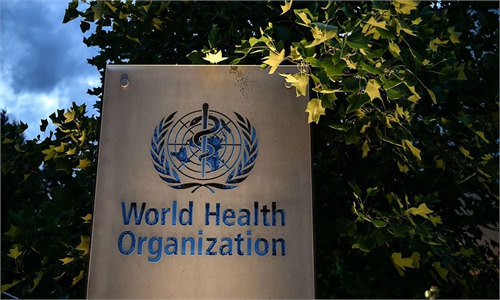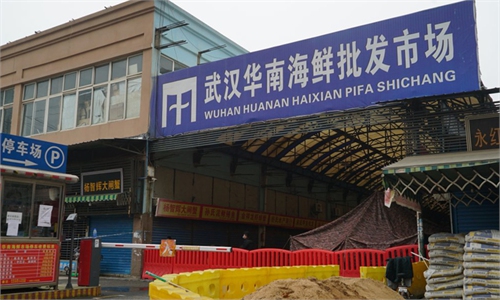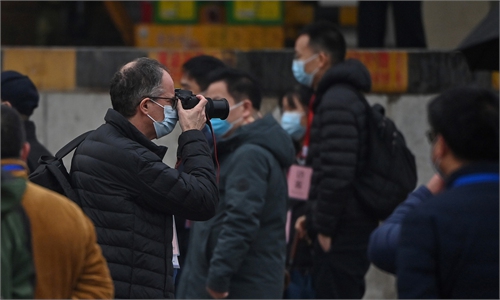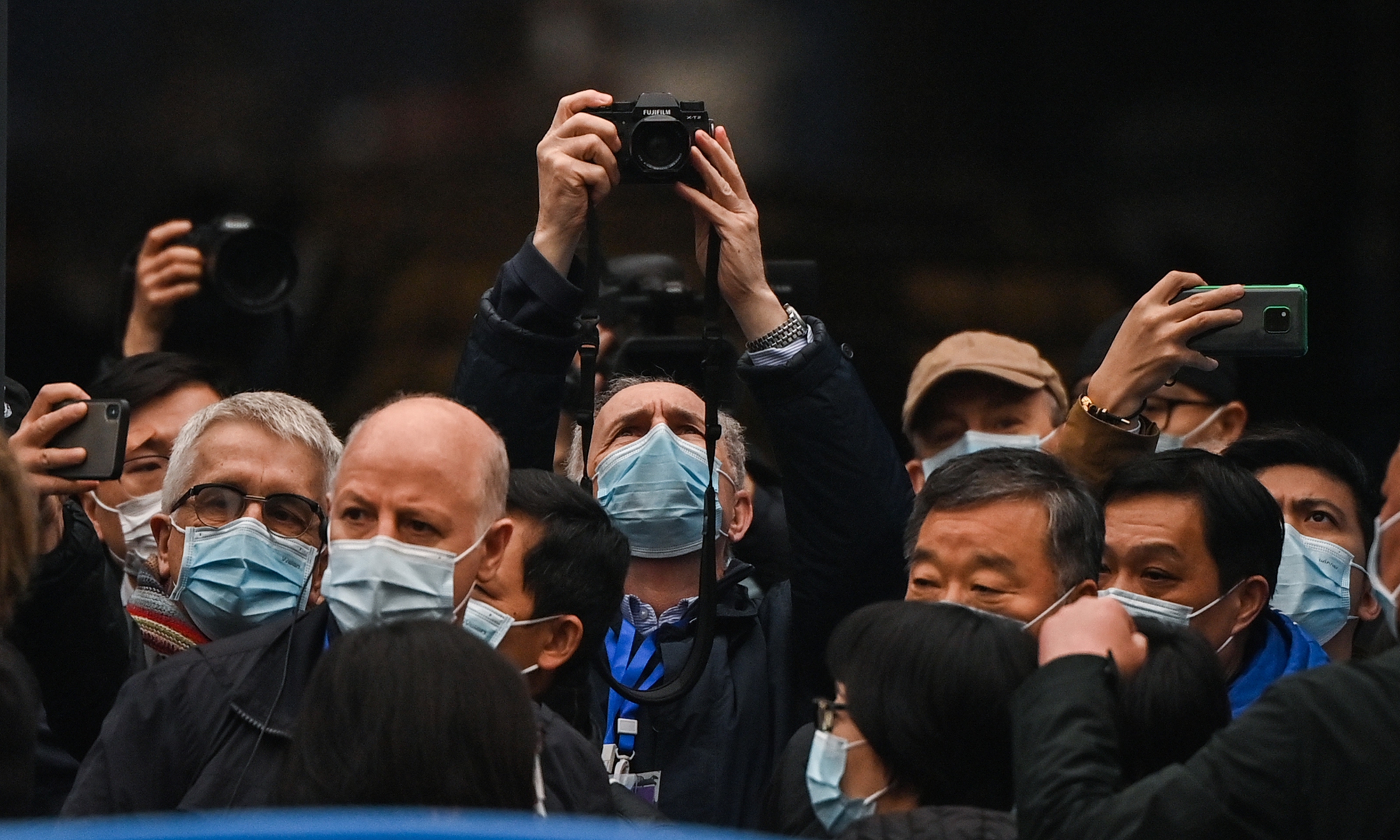
Members of the World Health Organization (WHO) team, investigating the origins of the coronavirus, visit the closed Huanan seafood wholesale market in Wuhan, Central China's Hubei Province on Sunday. Photo: AFP
In its efforts to search for clues to the origins of the novel coronavirus, the team of experts from the World Health Organization (WHO) on Sunday visited the cold-chain storage area of the largest agricultural product market in Wuhan, as well as Huanan seafood market which was sealed off in January 2020 after being drawn into speculation that the market was the possible origin of the early outbreak of the COVID-19.
"We went to two markets today. The Baishazhou this morning and Huanan this afternoon. We had some good discussions with market regulators, vendors, suppliers, and community leaders," Peter Ben Embarek, a Swiss food safety scientist who is leading the WHO team, told the Global Times.
Ben Embarek revealed to the Global Times that the team will go to the Wuhan Institute of Virology some time this week without specifying a date and will meet Chinese "bat woman" Shi Zhengli. WHO experts had already spoken with Shi during their hotel quarantine on her bat and coronavirus research, according to Ben Embarek.
Chinese experts believe the visits to the two markets represents the country's open and transparent attitude as the Huanan market was the place where the earliest case in Wuhan was found and it could give more clues for WHO experts to find out more information about earlier cases to understand the possible origins of the virus and its transmission pattern.
But they stressed that it is still a question if much earlier cases existed and whether patients in Wuhan were infected by domestic transmission or from other external sources of infections. Therefore, more evidence is needed before drawing any simple conclusions as the virus origins may have had links to some other unknown places in the world.
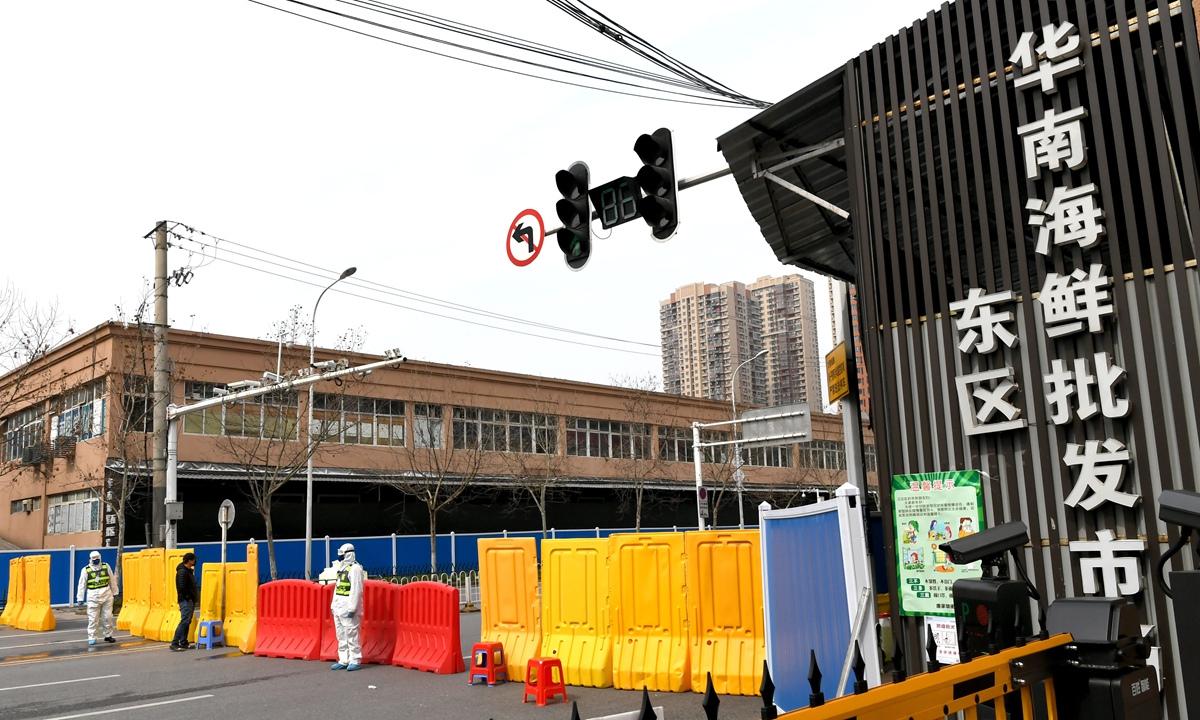
Staff members disinfect the Huanan Seafood Market in Wuhan, March 2020. Photo: cnsphoto
Eyeing the cold-chain products
Huanan seafood market was deemed to be the "original" place where the virus jumped from animals to humans at the very beginning despite there was no solid evidence to demonstrate that wildlife animals were sold here or that locals have the habit of consuming bats. The market was closed on January 1, 2020.
In May 2020, Chinese scientists discovered a novel coronavirus clade that is different from that shared among patients connected to the Huanan seafood market in Wuhan, which provides new evidence that the market may not be the origin of the virus, as it was previously speculated.
Peter Daszak, a zoologist and president of New York-based EcoHealth Alliance, described the visit to Huanan market in a Tweet on Sunday as "very informative and critical for our joint teams to understand the epidemiology of COVID as it started to spread at the end of 2019."
Huanan seafood market may offer some clues to the WHO team on the virus transmission pattern. But the animal origin of the virus is still unknown and needs efforts from global scientists, Wuhan-based virologist Yang Zhanqiu told the Global Times on Sunday.
Wu Zunyou, chief epidemiologist of the Chinese Center for Disease Control and Prevention, told the Global Times previously that in respect to the early outbreak in Wuhan, patients were mainly linked with the areas selling frozen seafood at Huanan seafood market.
The fact that seafood has caused flare-ups in Beijing, Dalian and Qingdao also raised the question whether the early outbreak in Wuhan was also triggered by imported seafood, Wu said.
Following the WHO experts' visit to the cold-chain storage area in Baishazhou market, some Chinese netizens raised the hypothesis once again: Is it possible that the coronavirus was passed on from cold-chain products into Wuhan, or more specifically, to the Huanan seafood market, where the sale of frozen products was once so prevalent?
Baishazhou market is the largest agricultural and sideline produce market in Wuhan. The Global Times reporter visited the market recently and found strict anti-epidemic measures were still implemented in the market, which requires visitors, logistics workers and store owners to register their health information, measure their body temperatures upon entering the market and wear facial masks all the time.
No wild animals and live poultry are allowed to be sold in the market, reads a poster on the entrance inspection station. An electronic screen in the market shows a notice from the Hongshan Market Supervision and Administration Bureau, which overseas the Baishazhou market. The notice encourages tip-offs on sales of cold-chain frozen food from illegal channels with a minimum reward of 200 yuan ($31) for each tip.
The WHO team's visit to Baishazhou is likely to give indications for international experts about food distribution and food categories within the city of Wuhan, as part of their investigations on the eating habits of Wuhan people, Wang Guangfa, a respiratory expert at Peking University First Hospital, told the Global Times on Sunday.
After the outbreak last year in Wuhan, Baishazhou had to take responsibility for ensuring the food supply of the city, according to merchants in the market. Baishazhou market was established in 2004, and covers an area of more than 46.6 hectares.
Wang, who was also a member of the China-WHO joint expert team and escorted the WHO experts in China in February 2020, said that it is unclear whether the international expert team seeking for virus origins is considering cold-chain products as an origin of the early outbreak in Wuhan, but no possibility should be ruled out as long as there is scientific evidence.
As the recent mounting sporadic outbreaks in China were found to have been related to imported cold-chain products, with other parts of the world, including Europe and the American continent, reportedly discovering signs of the coronavirus spread earlier than Wuhan, it begs a hypothesis: Did the early outbreak in Wuhan originate from imported frozen food?
To dig deeper, Global Times reporters visited Wuhan and talked with merchants from the Huanan Seafood Wholesale Market as well as prominent virologists and epidemiologists in November 2020. Although it might be too early to jump to any conclusion, the possibility that the coronavirus was passed on from contaminated cold-chain products into Wuhan cannot be ruled out. Yet more evidence is needed, and scientists worldwide are urged to join hands to further research this hypothesis and pinpoint the origin of the virus.
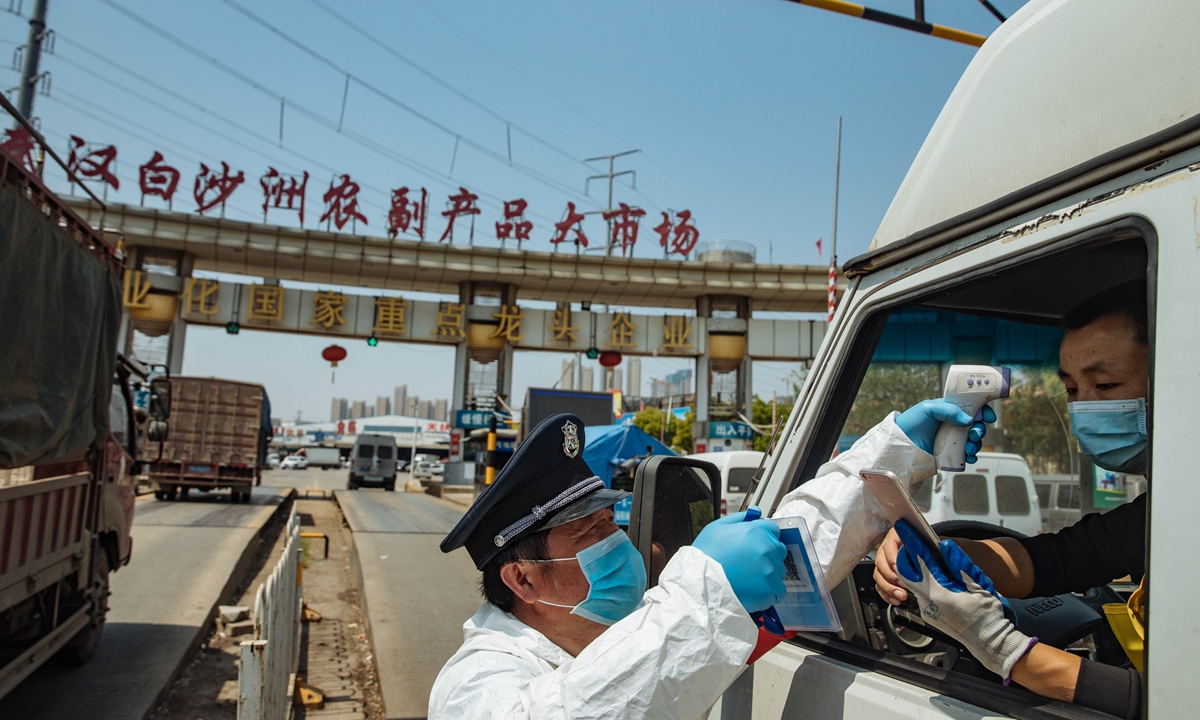
An anti-epidemic worker measures body temperature of a truck driver who is about to enter the Baishazhou food market, the largest farm market in Wuhan, on April 9. Photo: Li Hao/GT
Open-minded on any hypotheses
Mi Feng, spokesperson of China's National Health Commission, said at a press conference on Sunday that WHO experts had communications with medics and early patients when they visited Hubei Provincial Hospital of Integrated Chinese and Western Medicine and Wuhan's Jinyintan Hospital on Saturday. They also visited an exhibition featuring Chinese people fighting the epidemic in Wuhan.
Their reaching out to the first batch of patients who had exposure to the market would possibly shed light on the possible origin of the virus, and whether these patients were domestically infected or they were infected from imported cases or items, Jin Dongyan, a professor at the School of Biomedical Sciences at the University of Hong Kong, told the Global Times on Sunday.
Ben Embarek said that the WHO experts remain open-minded on a series of hypotheses on how the virus was introduced to humans and will explore each of them and plan new studies to better understand and explore them.
Mi said that in the next step the WHO international team will visit the center for disease control, scientific research institutes and markets. China will work with the WHO on studies of virus origin in a scientific and rigorous way, Mi said.
As always, China will continue to cooperate with the WHO with an open, transparent and responsible attitude, Mi noted.



